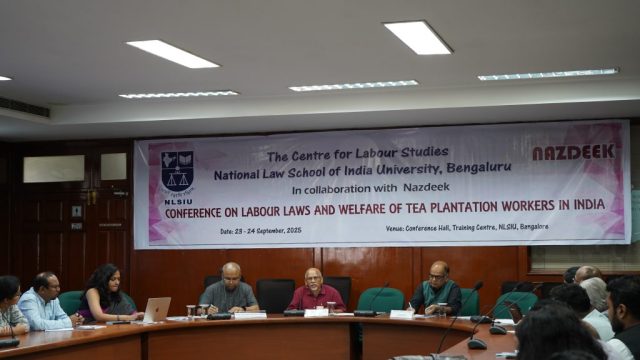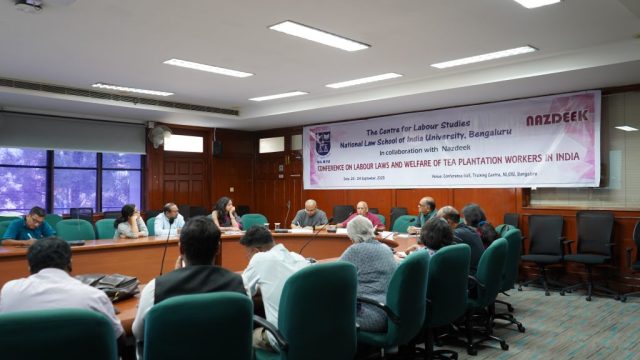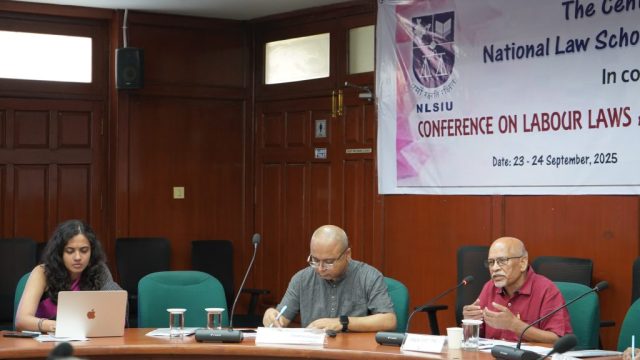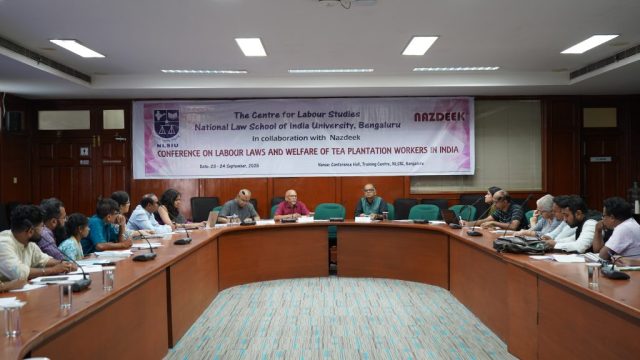Centre for Labour Studies & Nazdeek | Conference on Labour Laws and Welfare of Tea Workers in India
Ground Floor, Conference Hall, Training Centre, NLSIU
(Closed-doors event | Open only to the NLS community)
Tuesday, September 23, 2025, 10:00 am
The event will be held on Sep 23 & 24, 2025 (10 am to 5 pm)
The Centre for Labour Studies (CLS) at NLSIU is organising a two-day conference at its campus, in collaboration with Nazdeek. This Conference is aimed at bringing together diverse stakeholders to chart a path forward for realisation of decent working conditions for workers in tea plantations across India.
Concept Note
The tea industry is one of the most significant employers in South Asia, particularly in India, Sri Lanka, Bangladesh, and Nepal. According to a report of the Labour Bureau of Government of India, 5,40,840 workers were engaged in tea plantations in India in 2019. According to another estimate, the tea industry provides direct employment to over 1 million people while subsistence of another 10 million people is connected to the tea industry. Yet, despite its economic importance, tea plantation workers often face exploitative working conditions, inadequate wages, poor housing, and limited access to healthcare and education. Many of these issues stem from weak enforcement and inadequate reform of existing labour laws. Given the transnational nature of the tea supply chain, and the similarity in the challenges faced by tea workers across South Asian countries, it is vital to conduct a region-wide analysis of labour laws governing tea plantation workers. The ‘Conference on Labour Laws & Welfare of Tea Workers in India’ hopes to be the first phase of a longer engagement in conducting this region-wide analysis.
The conference will assess existing legal frameworks and their implementation on a pan-Indian level, while identifying gaps and opportunities for strengthening worker rights through legislative reforms and advocacy efforts. This assessment will be undertaken within the context of an examination of the structure of the tea value chain. The design of this conference will be in the form of panel-based substantive discussions which will foreground interventions, questions and points of discussion in the manner of a collaborative consultation. This consultation will be between leading trade unions, civil society organisations (CSOs), legal and financial policy experts, legal academicians, and labour advocates to discuss findings and devise an actionable roadmap.
This format will allow for different stakeholders to find a common platform to generate a synergy of ideas and form a concrete plan of action to implement the aforementioned legislative reforms, as well as imagine and cultivate new areas of intervention. The aim of the conference is to establish a working group involving these various stakeholders who will be tasked with the conception of a regionally coordinated action plan for advancing legislative reforms and advocating for improved working conditions in the tea industry in India. In the future, the hope is that this blueprint can result in future collaborations across South Asia.
About Centre for Labour Studies, NLSIU
The Centre for Labour Studies (CLS) is an autonomous Centre at the National Law School of India University (NLSIU). It has been set up as a multidisciplinary Centre to be able to address various issues that define regulation and governance in employment relations. It seeks to primarily engage with five issues: labour law and regulation; trade unions and collective bargaining; labour law governance, with focus on the Karnataka Labour Department; understanding employment relations and structure of industry in select sectors of informal and formal employment; precarious work and forced labour.
About Nazdeek
Nazdeek supports local organisations addressing socio-economic challenges through trust-based funding and technical support. Their partners include organisations and experts focusing on building women’s leadership in urban informal settlements, tea plantations, and the textile and garments sector. In over a decade of partnerships, they have facilitated and strengthened more than eight grassroots organisations, positively impacting at least a million of the most marginalised groups.
At present, Nazdeek’s grantees are implementing the legal empowerment model (LEM) in the states of Delhi, West Bengal, Assam, and Tamil Nadu.





